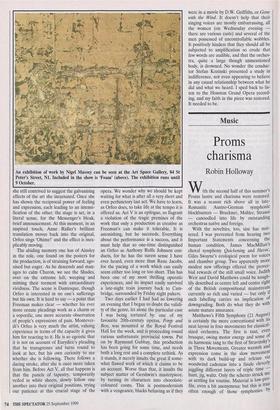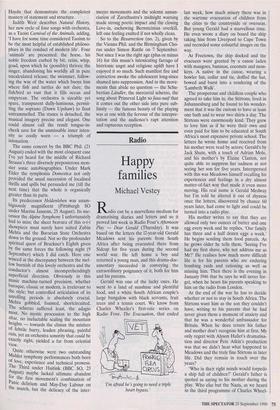Music
Proms charisma
Robin Holloway
With the second half of this summer's Proms lustre and charisma were restored. It was a season rich above all in late- Romantic Austro-German symphonic blockbusters — Bruckner, Mahler, Strauss — canoodled into life by outstanding orchestras native and foreign.
With the novelties, too, size has mat- tered. I was prevented from hearing two Important Statements concerning the human condition, James MacMillan's choral symphony Quickening and Havoc, Giles Swayne's ecological poem for voices and chamber group. Two apparently more modest new offerings offered the prover- bial rewards of the still small voice. Judith Weir and David Matthews could be naugh- tily described as centre left and centre right of the British compositional mainstream currently so rich and varied — but only if such labelling carries no implication of downgrading. Both do what they do with astute mature assurance.
Matthews's Fifth Symphony (21 August) is certainly the more conventional with its neat layout in four movements for classical- sized orchestra. The first is taut, even brusque, owing motor energy and some of its harmonic tang to the first of Stravinsky 's in Three Movements. Greater warmth and expression come in the slow movement with its dark build-up and release via woodwind cadenzas into a finale cleverly juggling different layers of triple time — hunt, jig, waltz. Only the scherzo struck hie as settling for routine. Material is low-pro- file, even a bit anonymous; but this is true often enough of those symphonies by Haydn that demonstrate the completest mastery of statement and structure.
Judith Weir describes Natural History, her new cycle of four songs with orchestra, as a Taoist Carnival of the Animals, adding, `I have for some time considered Taoism to be the most helpful of established philoso- phies in the conduct of modern life'. Four `animals' are presented: the horse, his noble freedom curbed by bit, reins, whip, goad, upon which he (possibly) thrives; the singer, abandoning his worldly all in pure uncalculated release; the swimmer, follow- ing the way of the water which buoys him where fish and turtles do not dare; the fish/bird so vast that it fills ocean and empyrean. The orchestra is sizeable yet spare, transparent dully-luminous, permit- ting the soprano (Dawn Upshaw) to float untrammelled. The stance is detached, the musical imagery precise and elegant. One could almost call the result tongue-in- cheek save for the unmissable inner inten- sity so coolly worn — a triumph of intonation.
The same concert by the BBC Phil. (21 August) ended with the most eloquent case I've yet heard for the middle of Richard Strauss's three diversely preposterous mon- ster sonic autobiographies. Under Mark Elder the symphonia Domestica not only provided the usual succession of localised thrills and spills but persuaded me (till the next. time) that the whole is organically greater than its parts.
Its predecessor Heldenleben was unam- biguously magnificent (Pittsburgh SO under Morriss Jansons, 25 August). Its suc- cessor the Alpine Symphony I unfortunately had to miss; the sheer bravura of this o-t-t showpiece must surely have suited Zubin Mehta and the Bavarian State Orchestra down to the ground. Not so the profounder spiritual quest of Bruckner's Eighth given by the same forces the following night (9 September) which I did catch. Here one winced at the discrepancy between the mel- low burnish of this lovely orchestra and the conductor's almost incomprehendingly superficial direction. Obviously in this music machine-turned precision, whether baroque, classic or modern, is irrelevant to the style; but controlled articulation of its unrolling periods is absolutely crucial. Mehta gobbled, foamed, shortcircuited. The scherzo suffered least, the adagio most. No mystic procession to the high altar, no ineluctable scaling the mountain heights — towards the climax the mixture of febrile hurry, leaden phrasing, painful cuts, yet an orchestra sonority that could be exactly right, yielded a far from celestial view.
Quite otherwise were two outstanding Mahler symphony performances both born of love, experience and technical prowess. The Third under Haitink (BBC SO, 23 August) maybe lacked ultimate abandon for the first movement's combination of Panic delirium and May-Day Labour on the march, but the delicacy of the inter- mezzo movements and the solemn annun- ciation of Zarathustra's midnight warning made strong poetic impact and the closing Love-in, eschewing Bernsteinian overkill, left one feeling exalted if not wholly clean.
So to the Resurrection (no. 2), given by the Vienna Phil. and the Birmingham Cho- rus under Simon Rattle on 7 September. Not since I was the right age (plus or minus 16) for this music's intoxicating farrago of histrionic angst and religiose uplift have I enjoyed it so much. Such manifest fire and conviction awoke the adolescent long-since shamed into suppression. And in the move- ments that abide no question — the Schu- bertian Liindler, the mercurial scherzo, the song about Primeval Light so faux-naif that it comes out the other side into pure sub- limity — the famous beauty of the playing was at one with the fervour of the interpre- tation and the audience's rapt attention and rapturous reception.



























































































 Previous page
Previous page